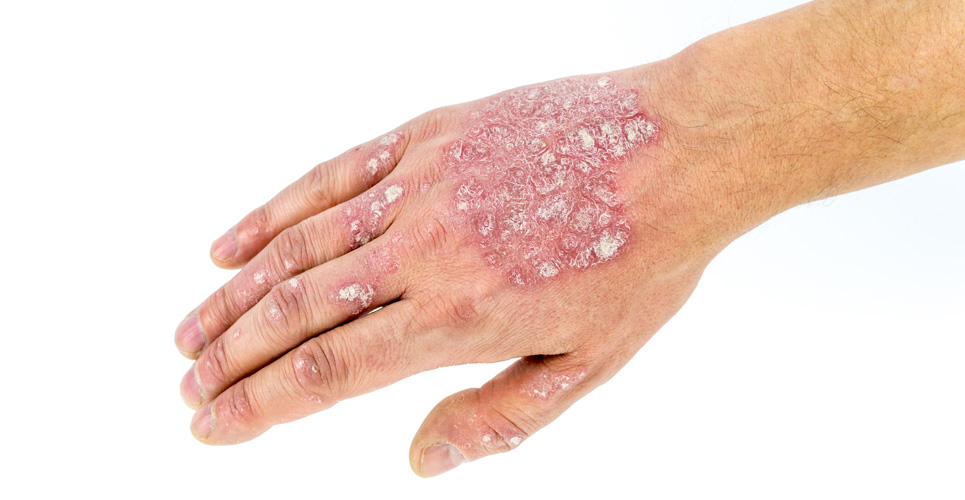A recent survey shows that two thirds of dermatologists do not refer to the most recent and comprehensive guidelines available for the management of psoriasis,[1] a chronic immune-mediated condition which affects up to 1.8 million people in the UK.[2]
Psoriasis is associated with significant psychological, social and physical implications on patients’ quality of life,[3] and the latest guidance from the National Institute for Health and Care Excellence (NICE) provides clear recommendations on the management of psoriasis, to standardise the wide variations in clinical practice across the UK.[4,5]
Helen McAteer, Chief Executive of The Psoriasis Association, says “The latest NICE recommendations highlight that people with psoriasis should have comprehensive management of their condition, which includes ongoing monitoring and reviews of the physical and psychological impact, along with access to treatments and healthcare professionals when appropriate. Whilst dermatologists clearly see the value in the assessment tools available to them, further progress must be made to ensure all patients have a PASI and DLQI assessment.”
In National Psoriasis Week, the Psoriasis Association calls for patients to be in control of their condition, with Helen McAteer concluding that “patients should not be afraid to ask their doctor for PASI and DLQI assessments, to start a conversation about the impact of the condition and to ensure they are receiving the best possible care and most appropriate treatment for their psoriasis.”
One year on from their publication only one third of dermatologists surveyed referred to the NICE guidelines on the assessment and management of psoriasis as a primary source of guidance.[1] In fact, 38% of dermatologists still refer to guidelines which are now over four years old,[1,6] which are not representative of the latest data and information available.
The NICE guidelines recommend that dermatologists should assess their patients’ psoriasis severity regularly using the PASI (Psoriasis Area and Severity Index) assessment tool, and state that the assessment of disease severity is fundamental to delivering high-quality health care.[4] While 86% of dermatologists surveyed said they found the PASI useful in monitoring changes in severity of psoriasis,[1] a 2012 survey of psoriasis patients showed that only one third of psoriasis patients have a PASI score.[7]
Psoriasis can be a highly stigmatising condition and assessment of the impact of psoriasis on a person’s wellbeing is also crucial. Psoriasis can contribute to low self-esteem, depression, relationship breakdown and absence from the workplace, and has an impact on health related quality of life that is comparable to other major medical conditions.[4]
NICE guidelines recommend the use of the Dermatology Life Quality Index, (DLQI) to assess the impact of psoriasis.[4] The survey results show that 82% of dermatologists find the DLQI useful in monitoring patients’ conditions,[1] and yet 87% of patients surveyed in 2012 were unaware of this assessment tool.[7]
References:
- Dermatologist survey. Data on file. October 2013.
- The Psoriasis Association. Available at: https://www.psoriasis-association.org.uk/pages/view/about-psoriasis . Accessed October 2013.
- International Federation of Psoriasis Associations. Psoriasis is a Serious Disease Deserving Global Attention. Available at: http://www.ifpa-pso.org/getfile.ashx?cid=279366&cc=3&refid=18. Accessed October 2013.
- National Institute for Health and Care Excellence. Psoriasis. Assessment and management of psoriasis. Clinical Guideline: methods, evidence and recommendations. October 2012
- Eedy DJ, Griffiths CE, Chalmers RJ et al. (2009) Care of patients with psoriasis: an audit of U.K. services in secondary care. British Journal of Dermatology. 160: 557-64.
- British Association of Dermatologists’ guidelines for biologic interventions for psoriasis 2009. British Journal of Dermatology 2009; 161:987-1019
- The Know Your PASI Follow-Up Survey. Data on file. October 2012
- The Psoriasis Association. Available at: http://www.psoriasis-association.org.uk/pages/view/about-psoriasis Accessed August 2013.
- Mrowietz U et al. Definition of treatment goals for moderate to severe psoriasis: A European consensus. Archives of Dermatological Research 2011; 303: 1-10
- US National Psoriasis Foundation. Available at http://www.psoriasis.org/about-psoriasis/treatments/severity Accessed October 2013.
